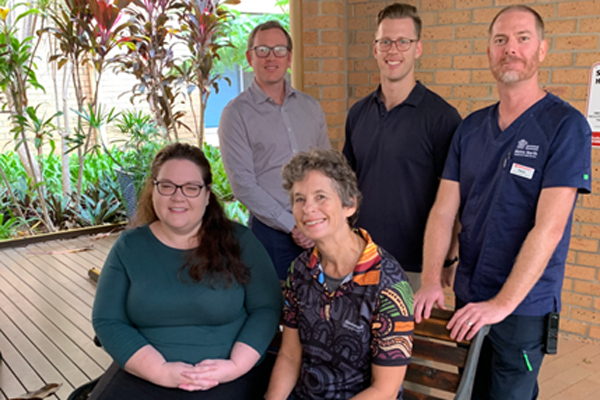- Foreword
- Message from Board Chair & Chief Executive
- 2023 Clinical Research Fellowships
- A message from the RBWH Foundation
- A message from The Common Good
- Metro North Research Excellence Awards
- Research stories
- ICU of the Future
- New approach ruling out pulmonary embolism
- Improving access to healthcare in the prison environment
- Safety and efficacy of peripheral versus centrally administered vasopressor infusion
- COVID-19 learnings set to inform future policy
- Telomere study could provide key to treating debilitating lung disease
- Productive Ward – Releasing time to care
- Brain organoids to revolutionise epilepsy treatment
- Reducing weight stigma in maternity care
- Parkinson’s Disease Check-In program giving people a voice
- Trial brings new treatment for common heart condition
- Teledentistry study shows promise in residential aged care
- Research fellow to boost Oral Health evidence-based care
- Study explores best approach to surgery for painful shoulder osteoarthritis
- The development and pilot testing of a stroke telerehabilitation decision toolkit
- Metro North Health delivers world-first breast scaffold surgery
- Regenerative jawbone hard at work care of collaborative Metro North Health approach
- Jamieson Trauma Institute leads e-scooter and e-bike injury research to drive community safety
- Forgotten fathers in pregnancy and obstetrics
- Putting the Spotlight on nursing and midwifery research
- Improving the health self-efficacy of stroke survivors
Improving access to healthcare in the prison environment

Left to right (seated) Senior Research Fellow Louise Purtell, Physiotherapist Wendy Milway. Left to right (standing) Director of Physiotherapy Caboolture Hospital David Thompson, Work Development Officer Nathanael Kirsch, Acting Nursing Director Emergency Caboolture, Kilcoy and Woodford Paul Kemp
A new physiotherapy service has been trialled at Woodford Correctional Centre (WDFCC) to address some of the challenges prisoners face accessing healthcare.
The healthcare needs of people in prison tend to be more complex compared to the rest of the community and delivering healthcare in a prison environment can be challenging for many reasons.
Issues relating to the logistics of transport and security, coupled with limited access to timely appointments are some of the difficulties faced when providing healthcare in the prison environment.
Trial Coordinator Caboolture Hospital Physiotherapy Practitioner Wendy Milway said it was important to improve how health services are delivered to people in prison. The positive trial results demonstrated the potential to improve patient outcomes by providing timely and accessible in-house physiotherapy assessment and treatment services.
Previously if a patient’s healthcare needs could not be met in prison, they were transferred out of WDFCC to unsecured outpatient areas in Metro North facilities, which was a costly logistical process with inherent safety issues.
“The health and wellbeing of people in prison are as important as the needs of the rest of the community, and this includes ensuring patients have access to all of the treatments they need to enhance their rehabilitation,” Wendy said.
“Many of our clients have chronic musculoskeletal issues and providing them with outpatient services like physiotherapy has been logistically difficult.
“Our project aim was to create an in-house physiotherapy service to reduce barriers and improve health outcomes by collaborating more closely with the client to make the service more accessible and easier to use.”
The weekly physiotherapy service was offered at WDFCC for 16 weeks and was attended by 38 clients who accessed between one and five appointments each. During the trial period metrics such as access to care, patient and staff experience, and self-reported pain scores were assessed.
All respondents to a satisfaction survey rated the service as good to very good with 100 percent of respondents stating the services met their needs. Staff respondents had similar positive experiences, and all participants wanted the service continued.
The project was developed in response to the 2020–2025 Queensland Health and Queensland Corrective Services Prisoner Health and Wellbeing Strategy which recognises that people in prison are part of our community and providing community equivalent care to improve their health is a critical part of improving the health and wellbeing of the whole community.
The project received grant funding from the Office for Prisoner Health and Wellbeing to trial the program, and following the program’s success, the team received ongoing funding from Clinical Excellence Queensland allowing the service to continue one day per week.
“Continuing the service is a significant project outcome because it supports the physical and mental wellbeing of people in our care and encourages them to maintain their health improvements after prison,” Wendy said.
The research team is comprised of Physiotherapist Wendy Milway, Work Development Officer Nathanael Kirsch, Director of Physiotherapy Caboolture Hospital David Thompson, A/ Nursing Director Emergency Caboolture, Kilcoy and Woodford Paul Kemp, Clinical Nurse Research Coordinator Stacey Watts, Health Practitioner Kelsey Pateman and Senior Research Fellow Louise Purtell.
The team plans to publish the study in the International Journal of Prisoner Health.
